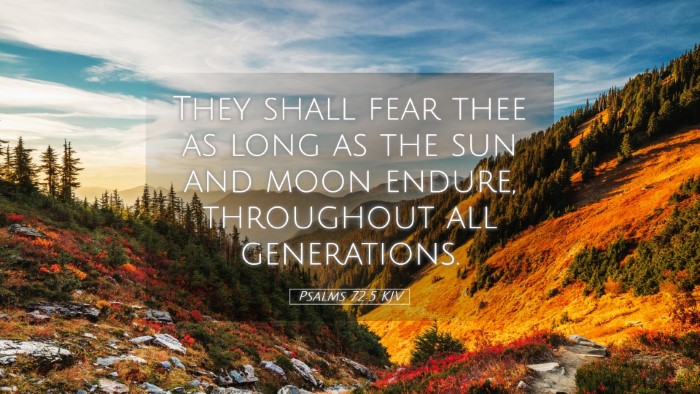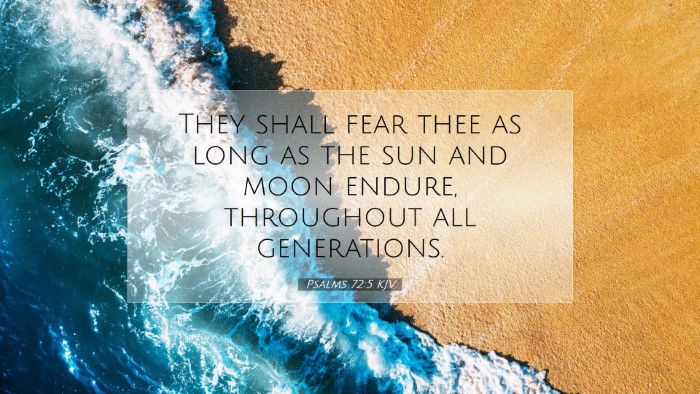Psalms 72:5 - Commentary Overview
Verse: "They shall fear thee as long as the sun and moon endure, throughout all generations."
Contextual Understanding
The verse is a part of a royal psalm attributed to Solomon that reflects on the ideal king and the blessings associated with his reign. It highlights the enduring nature of reverence towards God and the connection between divine authority and the natural order. The imagery of the sun and moon symbolizes constancy and reliability in the worship of God.
This verse appears to convey a prophetic vision, foreshadowing the reverence the nations will have for Christ, the ultimate King, as described throughout the scriptures.
Commentary Insights
-
Matthew Henry
Matthew Henry emphasizes the sacredness of a king who rules with righteousness and justice, stating that such a king will not only command respect from his people but will also engender a lasting reverence toward God. His comment underscores that this fear is not merely a terror but a profound respect and honor that will last as long as creation itself endures. Henry also connects this reverence to the glory of God being evident in the governance of a divinely appointed ruler.
-
Albert Barnes
According to Albert Barnes, the fear referenced in this psalm should be understood in the sense of reverence and awe towards God. He argues that such a fear is sustainable and suggests that the reference to the sun and moon indicates a promise of continuity in worship through generations. Barnes elaborates on how the acknowledgment of God’s glory and majesty brings about a healthy relationship between the ruler and those governed, positing that true leadership leads people to a genuine fear of God.
-
Adam Clarke
Adam Clarke interprets this verse as an affirmation of the king's reign, which is blessed by God and filled with justice. Clarke places significant emphasis on the phrase “as long as the sun and moon endure,” interpreting it as an indication of divine protection and favor that grants the king the ability to inspire fear and respect for God. Clarke suggests that the righteous governance of the king results in peace and piety among the people, which extends over time, reaching future generations.
Theological Implications
This verse presents profound theological implications regarding the nature of God’s sovereignty and the responsibility of rulers. The fear of God is tied to the recognition of His eternal authority, which serves as a bedrock for societal morality and peace. The continuity of this fear through generations also highlights the importance of nurturing a culture of reverence for God within families and communities.
Furthermore, it poses a challenge to modern-day leaders, urging them to lead in a manner that draws people toward God rather than away from Him. The connection between government and divine fear emphasizes the societal need for leaders who embody righteousness and justice.
Application for Pastors and Theologians
For pastors, this verse serves as a reminder to instill a reverential fear of God in their congregations. It prompts leaders to model behaviors that reflect God’s justice and mercy, forging a path that cultivates awe of the Creator among their followers. The role of preaching and teaching becomes crucial in promoting an understanding of God’s eternal nature and His rightful place in the lives of believers.
Theologians may explore the eschatological implications of this verse, considering how the fear of God as described here finds its ultimate fulfillment in the Messianic reign of Christ. The enduring nature of this reverence, linked to the permanence of the sun and moon, points toward a future where God's authority is universally acknowledged and honored.
Conclusion
Psalms 72:5 encapsulates a profound truth about the relationship between God, the ruler, and the people. It reminds us of the importance of reverence for God as the sustaining force behind righteous leadership and a just society. As believers and scholars, we are invited to reflect on how our lives, communities, and nations can embody the fear of the Lord that is meant to endure throughout the ages.


